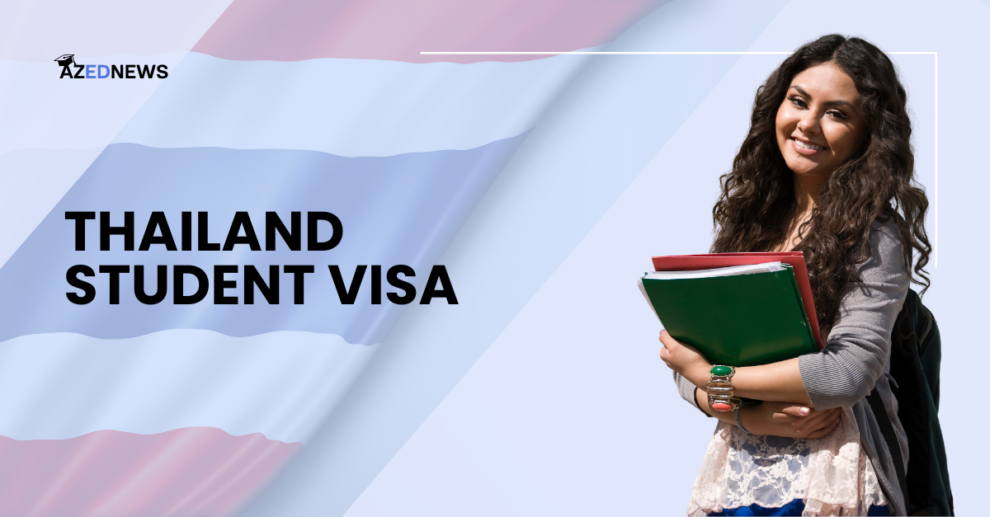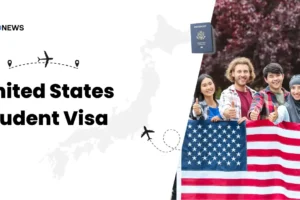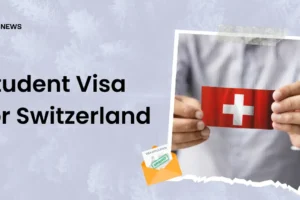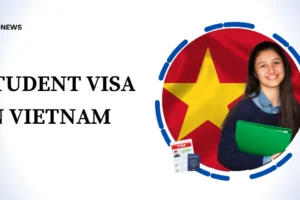For those seeking an education in Thailand Student Visa requirements allow foreign students to experience the renowned hospitality of the “country of smiles”. Thailand is recognized as a country of smiles because of its people, who are reputed to be amiable and kind. Every year, more and more foreign students come to Thailand to study.
Table of Contents
The nation is a fascinating place to live, has a diverse population, and is reasonably priced. Because of the excellent food, exciting nightlife, world-class beaches, and great academic standards, many international students choose to study here.
The nation is renowned for its top-notch science and technology education. Bangkok has been Thailand’s center of higher education for a long time; five of its universities are listed in the QS World University Rankings. Additionally, the QS ranking score places the student view at 16th.
In this blog, we have given information related to the Thailand Student Visa hence enabling students to apply for the same easily.
Key Takeaways:
- Every student who is not a resident of Thailand has to apply for a Student visa if they wish to study in the country.
- Students applying for a Thailand Student visa have to be enrolled in an educational institution in Thailand.
- The documents required to apply for a Thailand Student Visa include a passport, proof of admission, passport-size photographs, etc.
- The Thailand Student Visa is valid for 90 days after which students have to apply for an extension.
- Applicants have to pay around 2,000 Thai Baht for the Thailand Student Visa process.
- Students cannot work in Thailand on a Student visa.
- Some of the most popular courses include science, technology, agriculture, etc.
Who needs a Thailand Student Visa?
Everyone who is not a citizen of Thailand and wishes to study in Thailand has to apply for a student visa.
The Thailand student visa is a non-immigrant Thailand visa. It is issued to foreigners traveling to Thailand for the exclusive purposes of studies.
Eligibility of Thailand Student visa:
Thailand student visa comes under the category of non-immigrant student visa. It is specifically issued to international students traveling to Thailand for reasons other than tourism.
Some criteria that applicants are required to fulfill to receive a Thailand Student visa are:
- They should be enrolled in an educational institution in Thailand.
- The student should take at least three courses. Sometimes the requirement could be four courses depending on the school.
- Students should have at least 15 hours of classes every work.
However, these requirements for a Thailand Student Visa could change depending on circumstances, hence it is always advised to check thoroughly before applying.
What are the documents required to get a Thailand Student Visa?
When students apply for a Thailand Student Visa, they need to submit several documents to support their application. The important documents required for Thailand Student Visas are:
- A passport that is valid for at least six months and has at least two blank pages. If the applicant is applying for a one-year visa, the passport has to be valid for at least 18 months.
- A clear photocopy of the passport.
- A completed and signed Thailand Student Visa application form. Applicants can download it from the website of the Thailand Embassy or Consulate.
- Proof of admission to a University in Thailand addressed to the Thailand Embassy or Consulate in which the applicant shall apply. This could include a letter of admission from the university.
- Approval from the Ministry of Education if the application school is a private university.
- Registered documents of the school or university in Thailand.
- A letter of confirmation from the institution in which the student is enrolled if they are going to undergo an internship in the country.
- Passport-size photographs that follow the specifications given below:
- The dimensions should be 4cm x 6cm
- The picture should be clicked in front of a white background.
- The picture should be taken within the last six months
- The applicant must have a neutral facial expression and should see straight ahead.
- The face of the applicant should be visible.
- Headgears are allowed only for religious reasons and should not cover the face.
- Proof of sufficient financial means to cover the duration of stay. Students need to have 20,000 Thai Baht if they are traveling alone and around 40,000 Thai Baht if they are traveling as a family.
- A police clearance certificate, granted by their national authorities, attesting to their lack of criminal history. This is only required if they enroll in a course that lasts for a minimum of a year.
- Evidence that the Thai Student Visa cost was paid.
What is the procedure for a Thailand Student visa?
Applicants have to apply for a Thailand Student Visa or the Non-immigrant visa category “ED” at the nearest Thai Embassy or consulate.
Before the application, students should be accepted into a university in Thailand and should have a relevant enrollment letter. The application process for a Thai Student Visa is:
- Contacting the Thailand Embassy or Consulate where they will submit the visa application. Students can also visit the website if it is available. It is advised for students to learn about the opening hours, working days, and preferred methods for paying the visa fee.
- Making an appointment
- Collecting the required documents needed for a Thailand Student Visa.
- Submitting the documents and visa applications. Depending on which Embassy or Consulate students can submit the application in person or through a post.
- Waiting for the application to be processed
- Collecting the passport and the visa.
- If their Thailand student visa is granted, they will need to visit the nation before the expiration date written on the visa.
Most Asian countries have a simple student visa application procedure. Indonesia’s student visa application procedure is quite similar to Thailand’s student visa procedure hence making it easy for students to study in Asian countries.
What is the validity of a Thailand Student Visa?
A student visa for Thailand is good for one entry or multiple entries for up to ninety days. You will receive a 90-day visa even though your course of study is probably going to last at least a year.
For 1,900 Thai Baht, you can apply at the Thailand Immigration Department to extend your visa before it expires. It must be extended every ninety days before the current visa’s expiration.
How long does it take to process a Thailand Student Visa?
The processing time for a Thailand Student Visa depends on the Embassy or the Consulate through which the students apply.
On average, it takes about 5-10 business days. However, certain offices claim to process the visa in as little as two days.
What to do after receiving a Thailand Student Visa?
Every ninety days, foreign nationals who are residing in Thailand on a long-term basis are required to notify their address to the Thai Immigration Department.
All visa holders, regardless of the type of visa they possess, must follow this procedure. If you don’t register your stay, you could be fined 2,000 Thai Baht or have your visa revoked.
Extending Thailand Student visa:
For the period of your Thai student visa, you are permitted to visit Thailand for academic purposes. You can ask for an extension of your stay at the Thailand Immigration Department if you need to stay longer.
What is the cost of a Thailand Student visa?
A Thailand student visa costs 2,000 Thai Baht, or roughly US$ 65 or € 60. Nevertheless, the cost may vary slightly based on the local currency and the Embassy or Consulate where you submit your application.
Furthermore, the mode of payment for the Thailand Student Visa application fee varies according to the application location. A bank order may be required for payment by certain embassies or consulates, while cash payments may be required by others.
Can students work on a Thailand Student Visa?
No, you cannot work while on a student visa. Without a work permit, it is illegal for anyone to work in Thailand, and it seems that the Thai government is having trouble granting work permits to individuals with student visas.
Even though it isn’t strictly “paid employment,” many international students do labor once they arrive in Thailand to pay for their stay.
Popular courses in Thailand for International Students:
Currently, there are 156 higher educational institutions in Thailand. They come under autonomous, public, and private categories.
The three levels of qualifications are:
- Lower than a bachelor-level degree
- Bachelor level degree
- Graduate level degree
Autonomous universities receive funding from the government. However, the overall funding received is less than those received by public universities.
The courses offered by the Thailand universities include graduate diplomas, L.L.M, MBA, M.Com, M.Ed, M.Eng, and M.Sc programs among many others. The universities in Thailand are known to offer a high standard of education in departments such as:
- Science
- Technology
- Agriculture
- Environmental Sciences
- Business Management
Thailand boasts significant educational institutions that rank among the best in the world for foreign programs, making them globally competitive.
Students can also study human communities, ecology, biological sciences, international relations, economics, sustainable development, and ASEAN and Southeast Asian studies in the nation.
What are the top universities in Thailand for international students?
What is the admission process in Thailand?
Admission procedure in Thailand varies depending on the university. This country uses the Thai Central Admission Process of the TCAS system for bachelor’s degrees.
The TCAS systems involve five rounds in the admission process. They are:
- Portfolio round
- Quota round
- Direct admission round
- Central examination round
- Individual admission by faculties for unoccupied seats.
However, the private universities have a completely different admission process. This requires students to contact the university or visit their website to learn about the admission process in detail.
In general, students might be asked to submit the following documents:
- Application form with the right information
- Proof that the application fee has been paid
- A high school diploma if the application is for a Bachelor’s course.
- A bachelor’s diploma if the application is for a master’s program.
- Transcripts
- Proof of English proficiency through various tests like IELTS, PTE, or TOEFL.
- Medical certificates
- Passport size photographs
- Copies of valid passports and personal ID
- Letter of recommendation
- Personal statements
International applicants must submit their applications by the deadline to the university of their choice. The application dates may change depending on the student’s nationality, the study program, the university, and the admission period.
The general application deadlines are in November, December, and January, as well as March, April, and May.
Cost of tuition in Thailand for international students:
The tuition prices for public universities in Thailand are significantly lower than those of private universities. The cost of attending private universities varies depending on the school, the length of the term, and the course that the student chooses.
| Education Level | Tuition Fee (USD approx.) |
| Public Institutions | |
| Bachelor’s Degree | $600 to $2,800 per semester |
| Master’s Degree | $1400 to $4,800 per semester |
| Doctoral Degree Program | $7,000 per year |
| Private Institutions | |
| Bachelor’s Degree | $1200 to $2,800 per semester |
| Master’s Degree | $2000 to $3,200 per semester |
Cost of living in Thailand for international students:
| Accommodation | Cost (approx.) |
| Within Bangkok | |
| Single Occupancy | $160 to $480 per month |
| Twin-share | $140 to $320 per student per month |
| Studio Room | $200 per month |
| Apartment | Starting from $400 per month |
| Outside Bangkok | |
| Triple / Quadruple Share | $200 to $320 per student per semester |
| Double Occupancy | $300 to $600 per student per semester |
| Studio Room | Starting from $140 per month |
| Apartment | $200 to $400 per month |
Scholarships for international students in Thailand:
Scholarships are offered by Manu Educational Universities, either totally or partially supported. The list of international scholarships available in Thailand is provided below.
- Thailand International Postgraduate Program (TIPP)
- Education Fund International scholarship
- IELTS Test Fee Scholarship
- Japan Government Funding for Developing Countries Students at Asian Institute of Technology, Thailand
- Education Fund International Scholarship
- MA Program Scholarship at the School Of Global Studies, Thammasat University
- EFS Scholarship Program Thailand 2021-2022 for International Students
- SIT Zero Fees English Scholarship
- Women In Finance Scholarship 2021-22
- EIT International Excellence Scholarship
- Chulalongkorn University’s Graduate programme
- Harbour Space University Bangkok International Master’s Scholarship in Thailand
- Prince of Songkla University Faculty of Medicine International Student Graduate Scholarships
- SEARCA Graduate funding for Southeast Asians
- Asian Institute of Technology GAFS-AIT International Scholarship in Thailand
Frequently Asked Questions
1. How much is a student visa in Thailand?
Thailand student visa costs 2,000 Thai Baht, or roughly US$ 65 or € 60. Nevertheless, the cost may vary slightly based on the local currency and the Embassy or Consulate where you submit your application. Furthermore, the mode of payment for the Thailand Student Visa application fee varies according to the application location.
2. How long does a student visa last in Thailand?
The student visa in Thailand allows students to stay there for about 90 days. Foreign candidates who want to study at a university, or attend a seminar, training session, or internship in Thailand are granted a Thailand education visa.
3. Is it cheap to study in Thailand?
Yes, Thailand is an economical option for overseas students as it offers high-quality education at a fraction of the price of many Western nations.
4. How can I become a student in Thailand?
All foreigners wishing to study in Thailand must apply for a student visa. You must enroll in three or more classes in Thailand to maintain your student visa. However, it is advised that you take four courses so that you can have credible documentation of your education in Thailand.
5. Can students work with an education visa in Thailand?
It’s crucial to realize that those in Thailand on education visas are not allowed to work legally. Any type of job without the appropriate work authorization is prohibited and may result in severe repercussions. Heavy penalties, court cases, and even deportation could be among these repercussions.
Conclusion:
Thailand is a popular international tourist destination in Southeast Asia because of its world-class cities, distinctive tropical landscape, and simple visa application process.
You must apply for a Thai student visa, also known as a Thailand education visa, which is officially known as a non-immigrant visa-ED, if you intend to study, work on projects, or attend seminars, workshops, training courses, or internship programs in Thailand.
To be eligible for Thailand Non-immigrant visa category ED, you must submit your Thailand Education Visa application with all the required documentation, including information about the seminar, internship, workshop, or course you wish to attend, to ensure that it meets the minimum requirements for a student visa.












Add Comment